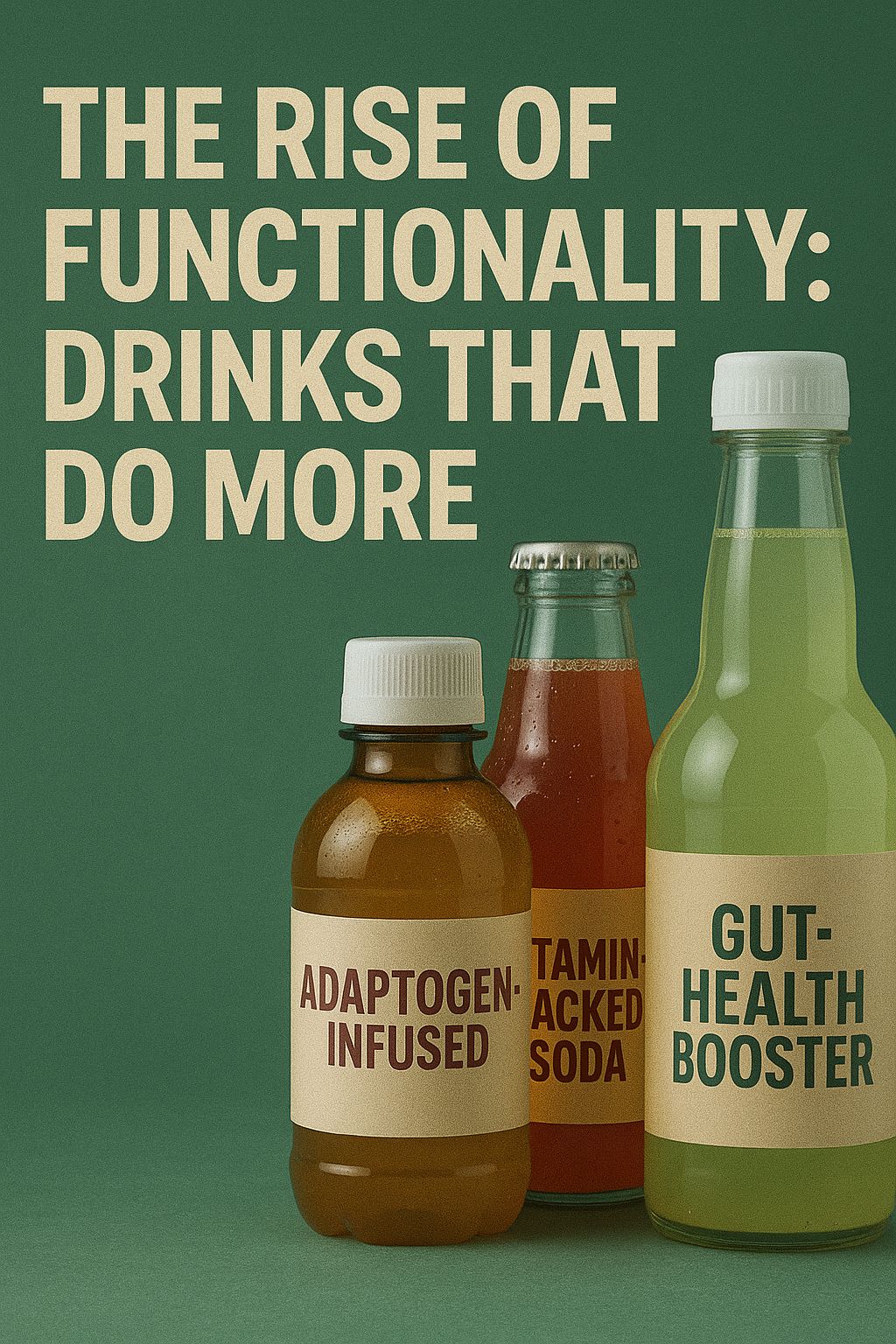- Consumer & Market Trends Newsletter
- Posts
- Sip or Skip
Sip or Skip
Why 2025 Is Redefining Premium, Function, and Flavor

Remember when “premium” meant a fancy bottle, a gold label, and an eye-watering price tag? That era’s lost its fizz. The beverage world in 2025 is charged with seismic changes, where every sip is a statement and every bottle tells a story. From health-focused innovations to Gen Z’s unapologetic demands for authenticity, the stakes have never been higher—or, frankly, more interesting.

The “premium” label still matters, but its meaning has changed radically. Today’s consumers are not dazzled by status symbols; they want value, quality, and most importantly, a brand story that resonates. The ultra-luxury tier ($100+) has shrunk, while the affordable luxury segment ($17–$49.99) is bustling with growth. It’s a remarkable pivot: shoppers view premium as accessible excellence, not unapproachable extravagance.protisglobal
Affordable luxury beverages are experiencing remarkable growth, while ultra-premium drinks are declining.protisglobal
Consumers are demanding quality and authenticity; 2025’s beverage buyers want to know the origin of their ingredients, who crafted their cocktails, and how those products impact the planet.protisglobal
Sustainability is central. Brands are reimagining supply chains, pioneering eco-friendly packaging, and investing in renewable energy for production.protisglobal
Labeling isn’t enough anymore. Consumers want substance, expertly crafted drinks, real people behind the brand, and visible ethical practices. In fact, packaging and sustainability are core to the premium equation now. Recyclable bottles, carbon neutral logistics, and water conservation have stopped being trendy add ons, they’re industry standards, with consumers using their purchasing power to reinforce these expectations.

The Rise of Functionality: Drinks That Do More
Wellness is no longer just a buzzword; it is fundamentally transforming beverage consumption. Functional beverages aren’t an afterthought or a niche—they’re the future. Adaptogen-infused drinks, vitamin-packed sodas, and gut-health boosters have exploded on the scene.
Key Figures to Note
Sales of functional beverages have grown by 54% since 2020, reaching $9.2 billion globally in 2025.protisglobal
Non-alcoholic alternatives have seen a 29% surge, fueled by Millennials and Gen Z pushing for healthier lifestyles and less alcohol.protisglobal
Probiotic sodas like Poppi and other gut-health-focused drinks are setting new benchmarks for category innovation.protisglobal
Flavors are evolving too. No longer confined to basic cola or lemon-lime, today’s beverage scene includes floral milks, tomato cocktails, savory sodas, and global spices. Milk tea product launches alone jumped over 130% across parts of Europe, reflecting changing tastes alongside functional priorities.
This quest for function means beverages now have to deliver more than a good taste—they need to provide health benefits, mental boosts, and even moments of relaxation or energy. Consumers want hydration and probiotics, adaptogens blended with botanicals, and drinks that cater to busy lifestyles and personal wellness goals.
Gen Z’s Playbook: Authentic, Ethical, and Digital

Gen Z is the engine behind many of these changes. For this generation, a beverage purchase is a reflection of beliefs, lifestyle, and wit. Status is out, story is in. This digitally connected, health-conscious cohort is actively revolutionizing what and how the world drinks.
Gen Z Power Stats
Gen Z’s preference for functional drinks (kombucha, adaptogen sodas, protein milks) is nearly 45% higher than previous generations.protisglobal
They are 45% more likely to discover drinks via social media and expect brands to reflect values such as sustainability, transparency, and inclusivity.provi+1
Low- and no-alcohol products remain popular, with over 41% of Gen Z regularly sipping non-alcoholic alternatives and curious about global flavors.protisglobal
Gen Z’s dedication to transparency and story has forced brands to get real. Marketing fluff and vague promises are out, this audience demands to know exactly where their drink comes from, who made it, and whether those people and processes align with their own values. Online influencers dominate their beverage discovery, with TikTok-driven trends propelling products from obscurity to viral sensation overnight.
Cocktails have evolved into a canvas for flavor, think bold infusions, herbal notes, and daring pairings. Brands winning Gen Z’s affection offer not just a drink, but a vibe, a philosophy, and an invitation to co-create. Digital engagement, transparency in sourcing, and innovative sustainability are their nonnegotiable.
Experiential Drinks and Tech-Driven Innovation
The party doesn’t stop at the bottle; beverage brands are creating experiences that ignite the senses. Pop-up bars, taste experiments, and interactive drink events are on the rise, bringing consumers face-to-face with creativity and fun.
Experience and Technology: The New Frontiers

Experiential events like immersive pop-up bars have seen Google searches rise 150% in the past year.bhg
AI-driven product launches are identifying novel blends, such as miso-infused cocktails or banana sodas, that would have seemed risky five years ago.publicissapient+1
Direct-to-consumer sales via e-commerce channels have spiked, reflecting demand for convenience and personalized shopping.protisglobal
Artificial intelligence isn’t just in the lab, it’s crafting flavors, predicting trends, and even personalizing packaging or drink formulas for micro-segments of the marketplace. Experiential marketing goes far beyond in-store sampling; events now blend virtual reality, social media contests, and immersive storytelling to turn every drink into a memory.
E-commerce is no longer a side dish. Beverage companies have invested heavily in direct-to-consumer platforms, blending old-school hospitality with big data and digital convenience. Brands now offer subscriptions, limited releases, and customized collections delivered to consumers’ doors with seamless efficiency.
Workforce: New Skills for a New Era
The shifting beverage landscape isn’t just changing what’s in the bottle—it’s transforming the whole team behind it. Beverage companies need professionals who can synthesize the old (classic product development, manufacturing) with the new (sustainability, data science, digital marketing).
Hiring Trends
The most valued candidates now blend expertise in traditional beverage manufacturing with skills in emerging tech, sustainability, and digital engagement.protisglobal
Demand for talent who can pivot between supply chain optimization and experiential marketing is at an all-time high.protisglobal
The workforce of tomorrow needs to innovate, communicate, and build genuine trust with consumers. Employees are expected to understand everything from eco-friendly packaging to crafting engaging TikTok content—all with an eye toward delivering premium, authentic value.
What Now? Critical Decisions and Industry Debates
With the beverage market in full revolution, some companies are pushing back. Legacy brands argue that “premiumization” is merely marketing semantics, clinging to old formulas and high prices. Yet the numbers don’t lie: the biggest growth is coming in functional beverages, accessible quality, and authentic storytelling—backed by a data-obsessed consumer base.protisglobal
Regulators and skeptics are challenging wellness claims, calling for higher standards and transparency in functional beverages. As brands race to launch new products, customers are quick to spot “healthwashing”—labels without substance—and punish them with declining sales.
Will bold, functional blends be the definitive future, or will cycles shift again toward traditional comforts? Can premium pricing survive scrutiny when authentic story and quality matter more?
Quick Facts and Punchy Stats
Affordable luxury segment up; ultra-premium downprotisglobal
Functional beverage sales hit $9.2 billiona 54% jump since 2020protisglobal
Non-alcoholic drinks up 29%, driven by younger consumersprotisglobal
Experiential events and pop-ups up 150% in online interestbhg
Gen Z is 45% more likely to discover new drinks via socialsprovi
Workforce demands blend sustainability, tech, and classic craftprotisglobal
Resources and Clickable Links
The Final Sip
2025 is not about chasing fads, it’s about embracing radical change. The beverage industry is maturing, innovating, and demanding more from every part of the supply chain. Whether through scientific breakthroughs, sustainable ambition, or the passionate disruptors of Gen Z, the revolution is happening right now. Will brands sip the opportunity, or will they be skipped? The ones willing to adapt and tell an authentic story, will shape the next chapter in beverage history.amcglobal+2
